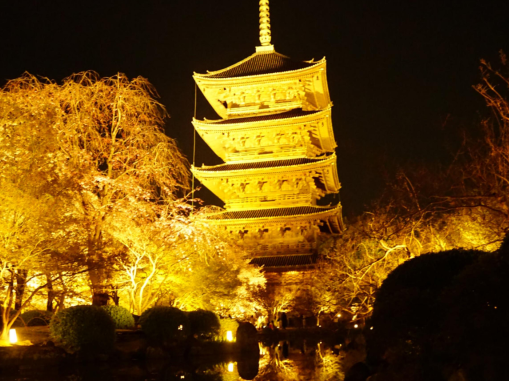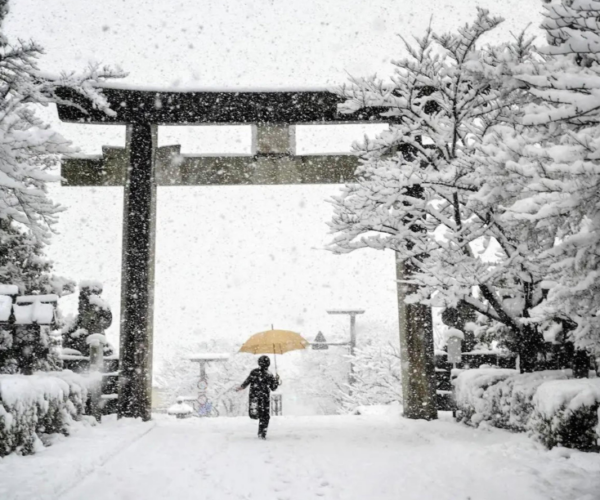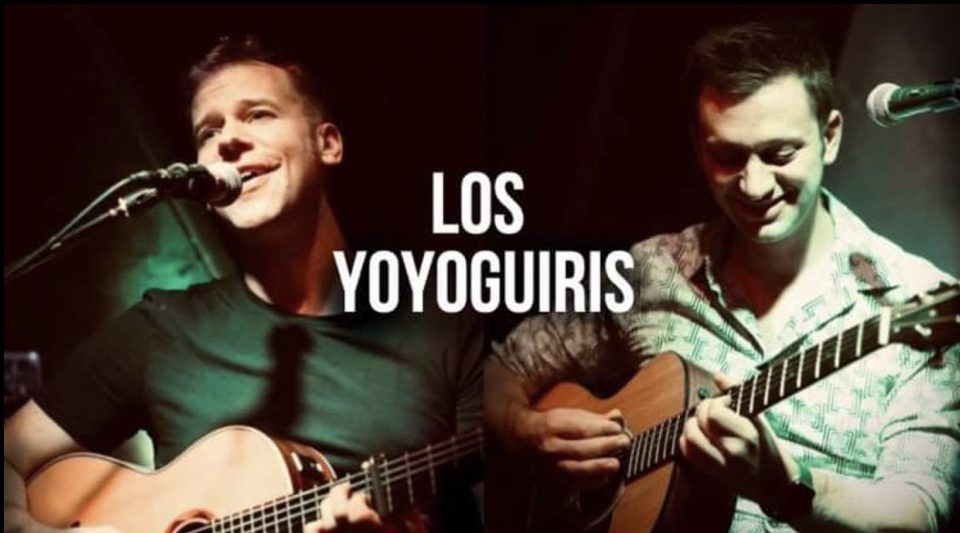This article originally featured in the April 2021 issue of Connect. Note: This interview was conducted on February 21st, 2021. It has been edited for length and clarity.
Alex Elliott (Tōkyō) and Adam Smith (Tōkyō) interviewed by Lisa Paper (Tōkyō) // Photos by Kyoko Obayashi
Los Yoyoguiris is a Tōkyō-based three person acoustic band that plays a mix of latin-inspired music, pop, rock, and recently, jazz. They sing a linguistically diverse set of music in English, French, Spanish, Portuguese, and a bit of Japanese. Adam and Alex play guitar and contribute vocals, and Ross plays percussion, handpan, and even Tibetan singing bowls. Oli, one of the band’s original co-founders, has since returned to England. Mostly performing in pubs and local venues, they enjoy crowd participation and encourage the audience to clap, sing, and dance along. The name was inspired in equal part by the Spanish word for gaijin, “guiri,” and Yoyogi park in Tōkyō, where the band was formed.
Hearing their internationally fun and catchy music, one may wonder, how do three gaijin make it onto the Tōkyō music scene, and what’s that like in the middle of a pandemic? Alex and Adam answered these questions, and more, while strumming their guitars in Yoyogi park.
Lisa: How long have you been playing in Tōkyō? How did you get started here?
Adam: We’ve been playing in Tōkyō since about the summer of 2015. So, five and a half years, we could say. Alex joined a year and a half ago. As to how we got started, actually, I was at a picnic in Yoyogi park (*dramatic pause as we all look around*) run by a Meetup group. I brought my guitar to the Meetup event and Oli, the guy I started the band with, he walked up and joined the picnic. It turns out that he played guitar too, and he asked me if I wanted to start a band. Then we started to play at open mic nights and did a few shows, and that’s how we got started.
Lisa: Is it difficult breaking into the music scene in Tōkyō? How have you established yourselves?
Alex: I’d actually say that it’s not too hard to break into the “gaijin music” scene here. If we were in say, NYC, it would be way harder. Same goes for London. You can be so talented and experienced and never be heard in places like that, because it’s so competitive there. There’s fewer people coming from all over the world to break into the scene here in Tōkyō. In terms of playing anywhere else, to earn a living at it is going to be hard.
Lisa: What inspires you to perform your set?
Adam: One, it’s fun for us. We like music from all over the world, and we like to play different kinds of songs. And two, we want to appeal to a wide audience. The music is also inspired by places in the world that some of the band members have lived and travelled in. (Example: Spain.)
Lisa: Is your audience mostly Japanese, or do you mostly play for other expats?
Adam/Alex: It’s a good mix of both I think, probably half and half. We only have two Japanese songs in our set at the moment, but we try to choose Western songs that Japanese people know, so that people feel included, no matter where they’re from.
Lisa: Do you write some of your own material?
Adam: We do mostly covers, but we’ve written one song recently. It’s called “Helios,” and it’s on YouTube and on our website. The percussionist, Ross, actually plays the handpan in our music video for that song.
Lisa: As part of an increasingly diverse music scene, Tōkyō has drawn musicians from all over. Do you think living in Japan has changed your style over time?
Alex: Well, we knew we had to include Japanese songs in our music.
Adam: So, we included one of the most famous Japanese pop songs in history, called “Ue Wo Muite Arukou.” Even my Dad knows that song, can you believe that? Because it was number one in the charts back in like 1970 or something.
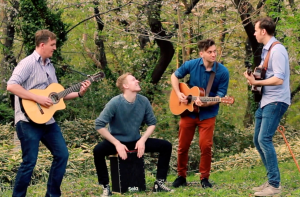 We always want to play to the audience. We like to try to please the audience. So it’s important that everyone has a good time. And the audience responded really well when we played it. When we performed it at What the Dickens, they loved it! The whole hall was singing along. It really reminds me of why I play music.
We always want to play to the audience. We like to try to please the audience. So it’s important that everyone has a good time. And the audience responded really well when we played it. When we performed it at What the Dickens, they loved it! The whole hall was singing along. It really reminds me of why I play music.
Alex: Yeah, there’s nothing like getting everyone in the audience singing, dancing, and having a good time. Audience participation is so great, there’s nothing like having forty or fifty people singing together. It’s such a great feeling.
Lisa: Who are some of the most influential musicians you’ve discovered in Japan? Have they shaped any of your music?
Alex: Well, I saw Los Yoyoguiris perform when I wasn’t yet in the band, and I was like, I wanna do that. So, I joined. (*Laughing.*)
But in terms of other bands in the Tōkyō music scene, Gypsy Unite were massively formative. They’re a band with a Japanese, an Italian, and a French musical artist, and they all play guitar amazingly well. They’re massively talented! We were very influenced by their style. Gypsy Unite, they play a lot of jazz. We were more pop before, and we started playing a lot more jazz because we started to hang out with them here in the park and play together often. And if the weather’s fine, we’ll play for like 10 hours. We have a bit more free time due to the pandemic.
Lisa: How has Covid impacted your performances and the music venues you play in?
Alex: It’s had a massive impact.
Adam: This isn’t a good time to try to be a professional musician, there’s no insurance if work falls through.
Alex: Agreed.
Adam: Most venues are not operating, or having any acts, if at all. Some live houses have closed down. Since the pandemic, we’ve only played at one venue, and during the state of emergency, the shows have to start and finish earlier than usual. And, there are fewer people at the shows.
And, we feel like we don’t want to cause a superspreader event at any of our shows. So, we’re not publicizing anything we’re doing very much, because we don’t want to spread the virus. But, we did play in Hakuba.
Alex: We were getting depressed with all the Christmas events getting cancelled, and out of the blue, someone asked if we’d like to play an event at a ski resort for 10 days. We played a gig every night at the ski resort, and it was amazing.
Adam: We would not have gotten that if it weren’t for the pandemic, because usually,
they bring in people from overseas. The organizer in Hakuba recommended us, so that’s what really got us the gig, so maybe that’s the silver lining of all of this.
Alex: Snowboard all day, jump in an onsen, play a gig, it was fun. It was great. We hope to go back and play again there. That kind of changed our style as well, it was mostly background music there, and jazz. So now, we’re inspired to play more jazz for fun. When you’re outside of Tōkyō as well, it feels less crowded. It feels more relaxed, and we had epic amounts of snow. It was an excellent time to practice background jazz music, a very different venue from a noisy pub where you want to encourage audience participation and have people sing along. So, it was a great opportunity to practice more jazz.
Lisa: What advice would you have for any aspiring musicians living in the expat community in Japan?
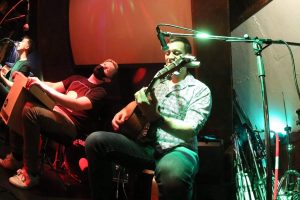 Alex: Go to the live house events, either the open mic gigs, or, any event, really. You don’t need to meet someone, you can look for them online on Facebook and get connected to the Tōkyō music scene online. We often see peo-ple joining Tōkyō music groups for foreigners. Open mics are the best way to get started in person though. You just need to go to one, and it will all snowball from there, and, don’t be shy! Say hi, it’s a good bunch of people in the Tōkyō music scene. People are always there for one another, people always go to other people’s gigs, it’s like a big and supportive family.
Alex: Go to the live house events, either the open mic gigs, or, any event, really. You don’t need to meet someone, you can look for them online on Facebook and get connected to the Tōkyō music scene online. We often see peo-ple joining Tōkyō music groups for foreigners. Open mics are the best way to get started in person though. You just need to go to one, and it will all snowball from there, and, don’t be shy! Say hi, it’s a good bunch of people in the Tōkyō music scene. People are always there for one another, people always go to other people’s gigs, it’s like a big and supportive family.
Lisa: What’s your favorite part about playing in Tōkyō?
Adam: I think for me, it’s feeling like a part of a community, because as a foreigner in Tōkyō, especially as a person who doesn’t speak Japanese, it can be hard to meet people and make new friends. So being a part of the live music scene can be a great way to be part of a supportive community and meet people.
Alex: Even before this band, all of my closest friends have come from music backgrounds, and Tōkyō is no different.
Adam: And it’s fun, and yeah, Tōkyō is no different from any other welcoming music community. So, we’re very happy that we can be here and perform.
Lisa: What’s your favorite song to perform at the moment?
Adam: It’s always the newest song. (*Laughing*) For Alex, it’s probably the Friends theme song.
Alex: We learned the Friends theme, and I love it! It’s such a good song, Japanese people know it, and I always watched it with my dad when I was a kid, so it makes me feel happy and nostalgic.
Adam: It’s a happy song, and we can both play the lead parts together, and the audience loves it and always claps. (*Claps the Friends clap.*)
It’s such a cool song if there’s a bunch of people and they all clap together. I like songs that have audience participation and songs in which people can easily join in.
I also enjoy playing anything by the band Rodrigo y Gabriela, a lot of our videos on our YouTube channel are of their songs. We’ve learned more of their songs than anyone else, they’re Latin rock instrumental, but very upbeat and very fun (to play.)
Lisa: Where can people come support the band/listen to your music?
Adam: What the Dickens, in Ebisu. We’re so grateful to have them stay open during these tough times, and it’s one of the best places to see free live bands in Tōkyō. It’s a great place to meet other musicians. The food is also delicious. Events are on our website and we also have a Facebook page with gig dates and times.
Lisa: What future projects do you have coming up?
Adam: We are learning a difficult song at the moment, and we’re working on playing more challenging jazz songs.
Alex: Ever since we started playing jazz, we’re trying to push ourselves to find harder songs to play, odd rhythms, songs with lots of chords, different tonalities, etc.
Adam: Our project is always becoming better musicians—an ongoing project.
We also have just put out a new video which we filmed in the deepest train station in Japan, in Gunma prefecture. We worked on it for months and making the video was a lot of fun. It’s called “Hanuman,” it’s a cover of a Rodrigo y Gabriela song. We feature both the cajón drums and the guitar in that video. The video has us haunting the station, which is quite eerie, like apparitions.
Lisa: Did you dress up as ghosts?
Adam/Alex: (*Laughing*) No . . . but we did dress up for something else!
Adam: A recent project we did was to celebrate Super Mario’s 35th birthday, so we filmed a Mario themed video with our bandmate in London (Oli). We did a quarantine style, split screen video collaboration with him, of the Mario theme song. Ross dressed up for it, he wore the Mario hat and did a Mario jump, it was great. You can find it on YouTube.
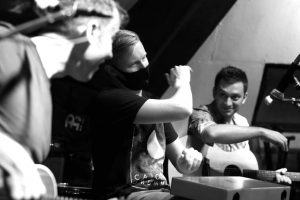
A lot of our projects since the pandemic have been music videos, because we’ve had less shows to do, so we’ve channeled a lot of our energy into making music videos. Ross is super talented and he makes music videos for a living for his own YouTube channels. He has one of the top instructional cajón music channels on YouTube. We’ve been able to make professional quality vids because of his experience and knowledge of how to use the video equipment.
Lisa: That station sounds cool. How did you find out about it?
Adam: I was staying nearby to go hiking, and I’d read about this station in a Lonely Planet guidebook. And it’s like 500 steps down underground, and there are only about 15 passengers per day in the deepest station in Japan. It’s called Doai Station, in Gunma. I visited there, and I was blown away, it’s such a cool place, it’s really photogenic. It feels like it’s abandoned. It’s very atmospheric and feels haunted, so I kept it in the back of my mind. When we were talking about shooting the music video, we thought this station would fit the mood of the song perfectly, and decided to film it there.
Lisa: Who are some of the most influential musicians you’ve discovered in Japan? Have they shaped any of your music?
Alex: Well, I saw Los Yoyoguiris perform when I wasn’t yet in the band, and I was like, I wanna do that. So, I joined. (*Laughing.*)
But in terms of other bands in the Tōkyō music scene, Gypsy Unite were massively formative. They’re a band with a Japanese, an Italian, and a French musical artist, and they all play guitar amazingly well. They’re massively talented! We were very influenced by their style. Gypsy Unite, they play a lot of jazz. We were more pop before, and we started playing a lot more jazz because we started to hang out with them here in the park and play together often. And if the weather’s fine, we’ll play for like 10 hours. We have a bit more free time due to the pandemic.
Lisa: How has Covid impacted your performances and the music venues you play in?
Alex: It’s had a massive impact.
Adam: This isn’t a good time to try to be a professional musician, there’s no insurance if work falls through.
Alex: Agreed.
Adam: Most venues are not operating, or having any acts, if at all. Some live houses have closed down. Since the pandemic, we’ve only played at one venue, and during the state of emergency, the shows have to start and finish earlier than usual. And, there are fewer people at the shows.
And, we feel like we don’t want to cause a superspreader event at any of our shows. So, we’re not publicizing anything we’re doing very much, because we don’t want to spread the virus. But, we did play in Hakuba.
Alex: We were getting depressed with all the Christmas events getting cancelled, and out of the blue, someone asked if we’d like to play an event at a ski resort for 10 days. We played a gig every night at the ski resort, and it was amazing.
Adam: We would not have gotten that if it weren’t for the pandemic, because usually, they bring in people from overseas. The organizer in Hakuba recommended us, so that’s what really got us the gig, so maybe that’s the silver lining of all of this.
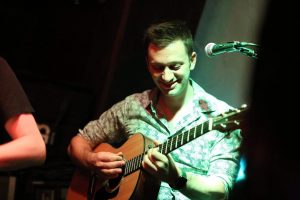
Alex: Snowboard all day, jump in an onsen, play a gig, it was fun. It was great. We hope to go back and play again there. That kind of changed our style as well, it was mostly background music there, and jazz. So now, we’re inspired to play more jazz for fun. When you’re outside of Tōkyō as well, it feels less crowded. It feels more relaxed, and we had epic amounts of snow. It was an excellent time to practice background jazz music, a very different venue from a noisy pub where you want to encourage audience participation and have people sing along. So, it was a great opportunity to practice more jazz.
Lisa: What advice would you have for any aspiring musicians living in the expat community in Japan?
Alex: Go to the live house events, either the open mic gigs, or, any event, really. You don’t need to meet someone, you can look for them online on Facebook and get connected to the Tōkyō music scene online. We often see peo-ple joining Tōkyō music groups for foreigners. Open mics are the best way to get started in person though. You just need to go to one, and it will all snowball from there, and, don’t be shy! Say hi, it’s a good bunch of people in the Tōkyō music scene. People are always there for one another, people always go to other people’s gigs, it’s like a big and supportive family.
Lisa: What’s your favorite part about playing in Tōkyō?
Adam: I think for me, it’s feeling like a part of a community, because as a foreigner in Tōkyō, especially as a person who doesn’t speak Japanese, it can be hard to meet people and make new friends. So being a part of the live music scene can be a great way to be part of a supportive community and meet people.
Alex: Even before this band, all of my closest friends have come from music backgrounds, and Tōkyō is no different.
Adam: And it’s fun, and yeah, Tōkyō is no different from any other welcoming music community. So, we’re very happy that we can be here and perform.
Lisa: What’s your favorite song to perform at the moment?
Adam: It’s always the newest song. (*Laughing*) For Alex, it’s probably the Friends theme song.
Alex: We learned the Friends theme, and I love it! It’s such a good song, Japanese people know it, and I always watched it with my dad when I was a kid, so it makes me feel happy and nostalgic.
Adam: It’s a happy song, and we can both play the lead parts together, and the audience loves it and always claps. (*Claps the Friends clap.*)
It’s such a cool song if there’s a bunch of people and they all clap together. I like songs that have audience participation and songs in which people can easily join in.
I also enjoy playing anything by the band Rodrigo y Gabriela, a lot of our videos on our YouTube channel are of their songs. We’ve learned more of their songs than anyone else, they’re Latin rock instrumental, but very upbeat and very fun (to play.)
Lisa: Where can people come support the band/listen to your music?
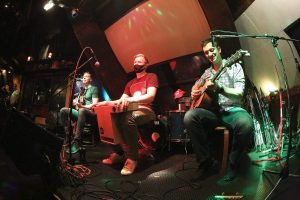 Adam: What the Dickens, in Ebisu. We’re so grateful to have them stay open during these tough times, and it’s one of the best places to see free live bands in Tōkyō. It’s a great place to meet other musicians. The food is also delicious. Events are on our website and we also have a Facebook page with gig dates and times.
Adam: What the Dickens, in Ebisu. We’re so grateful to have them stay open during these tough times, and it’s one of the best places to see free live bands in Tōkyō. It’s a great place to meet other musicians. The food is also delicious. Events are on our website and we also have a Facebook page with gig dates and times.
Lisa: What future projects do you have coming up?
Adam: We are learning a difficult song at the moment, and we’re working on playing more challenging jazz songs.
Alex: Ever since we started playing jazz, we’re trying to push ourselves to find harder songs to play, odd rhythms, songs with lots of chords, different tonalities, etc.
Adam: Our project is always becoming better musicians—an ongoing project.
We also have just put out a new video which we filmed in the deepest train station in Japan, in Gunma prefecture. We worked on it for months and making the video was a lot of fun. It’s called “Hanuman,” it’s a cover of a Rodrigo y Gabriela song. We feature both the cajón drums and the guitar in that video. The video has us haunting the station, which is quite eerie, like apparitions.
Lisa: Did you dress up as ghosts?
Adam/Alex: (*Laughing*) No . . . but we did dress up for something else!
Adam: A recent project we did was to celebrate Super Mario’s 35th birthday, so we filmed a Mario themed video with our bandmate in London (Oli). We did a quarantine style, split screen video collaboration with him, of the Mario theme song. Ross dressed up for it, he wore the Mario hat and did a Mario jump, it was great. You can find it on YouTube.
A lot of our projects since the pandemic have been music videos, because we’ve had less shows to do, so we’ve channeled a lot of our energy into making music videos. Ross is super talented and he makes music videos for a living for his own YouTube channels. He has one of the top instructional cajón music channels on YouTube. We’ve been able to make professional quality vids because of his experience and knowledge of how to use the video equipment.
Lisa: That station sounds cool. How did you find out about it?
Adam: I was staying nearby to go hiking, and I’d read about this station in a Lonely Planet guidebook. And it’s like 500 steps down underground, and there are only about 15 passengers per day in the deepest station in Japan. It’s called Doai Station, in Gunma. I visited there, and I was blown away, it’s such a cool place, it’s really photogenic. It feels like it’s abandoned. It’s very atmospheric and feels haunted, so I kept it in the back of my mind. When we were talking about shooting the music video, we thought this station would fit the mood of the song perfectly, and decided to film it there.
Lisa: Well, that about wraps things up. Anything you’d like to add?
Adam/Alex: We’re grateful to Kyoko for taking our band photos. She documents the international band scene in Tōkyō. We’re grateful to John and Hiromi at What The Dickens in Ebisu for giving musicians in Tōkyō like us a stage to perform on and for giving music fans here a warm and welcoming place to see free live music. We are, personally, very grateful to two former JETs and fantastic folks, Taryn and John, for getting us on at Hakuba.
Liked the article, curious about the music? You can check out the band’s work here:
Website
Band Youtube Channel
Ross’s Youtube Channel
Alex Elliott came to Tōkyō from London in 2011 in search of reliable and timely transit systems. He also plays guitar and sings.
Adam Smith wears many hats by day and a guitar by night. Originally from Virginia, he has been based in Tōkyō since 2014.
Ross McCallum is an Australian cajón player and YouTuber best known for using fast finger-tapping techniques and adapting the instrument to many modern styles of music. His channel on YouTube is one of the most popular destinations online for cajón learners. Ross is also a frequent collaborator with other artists & musicians around the world.
Lisa Paper is a Tōkyō JET and returned Peace Corps volunteer. This is her third contribution to CONNECT magazine.
